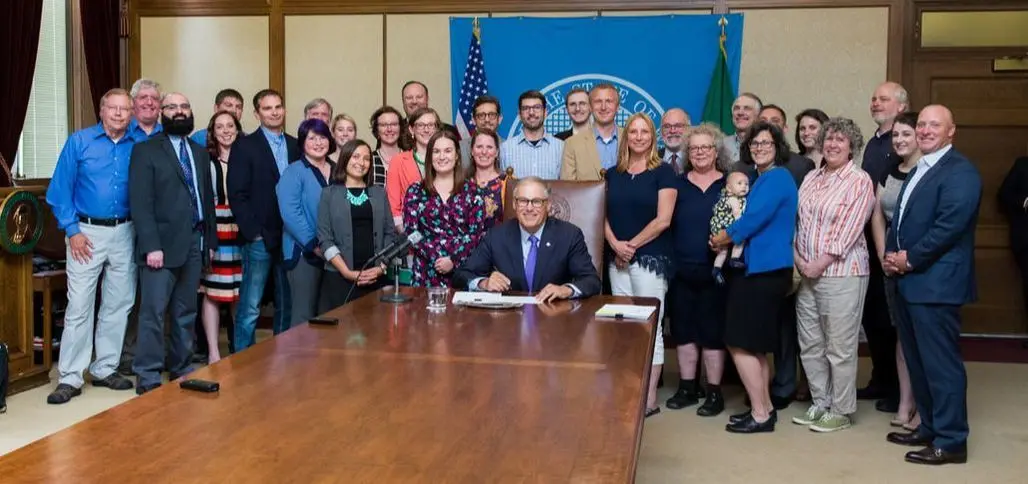Washington Targets Solar Scams
Washington homeowners scored a legislative victory by passing the Washington Solar Consumer Protection Act, a robust piece of legislation meant to shield them from solar scams and deceptive solar industry practices.
Signed into law by Governor Jay Inslee, the Washington Consumer Protection Act came into effect on June 7, 2024. The act responds to an onslaught of misleading online solar ads and aggressive door-to-door solicitations, offering “free” rooftop solar installations—a tactic widely discredited by local utilities and solar professionals.
This new law promises a brighter, more honest future for solar energy in Washington, safeguarding residents from the false promises that have clouded the industry.

“The most common abuse that we’ve seen is fly-by-night companies that swoop in and overpromise and underdeliver”
Bill Will, senior policy advisor at the WASEIA trade group.
Working closely with the Washington Department of Commerce, the Washington Solar Energy Industries Association (WASEIA) played a key role in crafting this bill.
Protecting the Washington Solar Industry
Washington residents have been bombarded with online ads promising “free” solar panel installations, which utilities and local solar companies have debunked. These misleading ads, often generated by out-of-state companies, coupled with aggressive sales tactics, have led to complaints of overpromised solar incentives, savings, and flawed solar installations.
The absence of specific provisions in the state’s consumer protection code necessitated new rules and enforcement mechanisms. These new rules were developed in partnership with the Washington State Department of Commerce, WASEIA, local solar contractors, and electric utilities.
The new legislation is a step in the right direction regarding accountability and enforcement, as it would make it easier for private attorneys and the consumer protection division of the state attorney general’s office to police the solar industry.
Washington Responds to Solar Scams
Recognizing the need for consumer protection in the rapidly growing solar sector, state lawmakers collaborated with industry stakeholders to address solar scams and unscrupulous sales tactics.
Nora Hawkins, Senior Energy Policy Specialist at the Washington Department of Commerce, highlighted the bill’s aim to provide clarity and accountability for solar installations.
“This bill would help residents and businesses understand what they will and will not be getting with a solar energy install, and prevent deceptive solar sales tactics and create an ability to hold bad actors accountable”
Nora Hawkins, Senior Energy Policy Specialist at the Washington Department of Commerce
Key Provisions of the Washington Solar Consumer Protection Act
The Solar Consumer Protection Act introduces measures to curb predatory tactics, standardize contractual language, and reinforce installer licensing regulations, while also empowering the Attorney General’s office to penalize non-compliant solar companies.
Solar contracts must now transparently disclose costs, system performance expectations, and consumer rights. These provisions are meant to ensure fair comparison and protection against deceptive practices.
Before you sign a contract or end up with wonky solar panels on your house, you should understand the consumer protections guaranteed to you by the state of Washington.
Some of the regulations for businesses now include:
- Licensing Requirements
- Anyone conducting business related to solar energy systems worth over $1,000 (including companies, contractors, and advertisers) must be licensed.
- DIY homeowners installing their own solar panels are exempt.
- Transparent Contracts
- Solar companies must provide clear, detailed contracts, including:
- Scope of work and installation details
- Financing terms and warranty information
- Net metering details
- Estimated energy savings for the first 12 months
- Procedures if you need to replace your roof
- Solar companies must provide clear, detailed contracts, including:
- Rescission Rights: A 3-Day Cooling-Off Period
- Just like airlines offer a 24-hour flight cancellation policy, you have three business days to cancel your solar contract—no strings attached.
- No Upfront Payments
- You don’t have to pay anything during the three-day window, so you can sign with confidence knowing you won’t lose money if you change your mind.
- Utility Approval Required Before Installation
- Your electric utility must approve your solar system before installation to ensure compliance and grid safety.
- Penalties For Non-Compliance
- The Attorney General’s office has the authority to penalize bad actors taking advantage of consumers if they disregard any of the above measures.
Empowering Washington Consumers
To safeguard against unscrupulous solar contractors, consumers are advised to inquire about the Solar Consumer Protection Act when engaging with contractors, review contracts using provided guidelines, and obtain multiple quotes for informed decision-making.
Red Flags: How to Spot A Solar Scam
As you’re hunting for the best solar company to partner with for your solar energy system, here are some signs that you’re dealing with fishy people.
- Your contractor doesn’t know about the Solar Consumer Protection Act.
- If they’re unaware of these regulations, that’s a huge red flag. A reputable company should be licensed and transparent about its business practices.
- The contract is missing key protections.
- The Washington Solar Energy Industries Association (WASEIA) provides a Consumer Checklist outlining essential contract terms. If those aren’t in your agreement, proceed with caution.
- The warranty is less than 10 years.
- A reliable solar installer should offer at least a 10-year warranty on both the system and installation. If the bid includes a short or no warranty, it’s a bad sign.
Local Solar Installers’ Role
Local solar companies continue investing in their community’s well-being and environmental sustainability by prioritizing transparency in customer interactions while ensuring residential solar energy systems comply with best practices set by NABCEP solar installation standards.
In order to contribute to the long-term success of the solar industry, local solar contractors should provide clear information, foster trust, and provide their customers with information concerning their rights as outlined by these new provisions.
Why Homeowners Trust A&R Solar
As a local business operating in the Pacific Northwest for almost two decades, one of our three guiding principles has been to deliver exceptional value to our customers. This commitment is one of the reasons A&R Solar supported the Washington Solar Consumer Protection Act as part of the Washington Solar Energy Industries Association, a state industry group of local installers.
- We supported the Washington Solar Consumer Protection Act through our involvement with WASEIA, advocating for better industry standards.
- We offer a performance guarantee—if your system underperforms, we’ll refund 110% of the difference.
- Every installation includes a 10-year warranty covering workmanship, materials, and labor. We even replace faulty equipment at no cost within the first 10 years.
The Washington Solar Consumer Protection Act is a win for homeowners, providing essential safeguards for those investing in solar energy. By understanding the key protections and staying vigilant for red flags that may arise, you can help make the solar industry better.
When in doubt, always ask questions, do your research, and trust your instincts to ensure you’re getting the best deal for your solar investment.
“For most WASEIA members, it’s not going to be a big impact”
A&R Solar welcomes the Washington Solar Consumer Protection Act, as it represents a significant step towards ensuring fairness and integrity in Washington’s solar energy sector, empowering consumers and fostering responsible industry practices.
As a longtime WASIEA member, A&R Solar played an influential role in drawing attention to these issues while also contributing to the development of key provisions within this new legislation.
